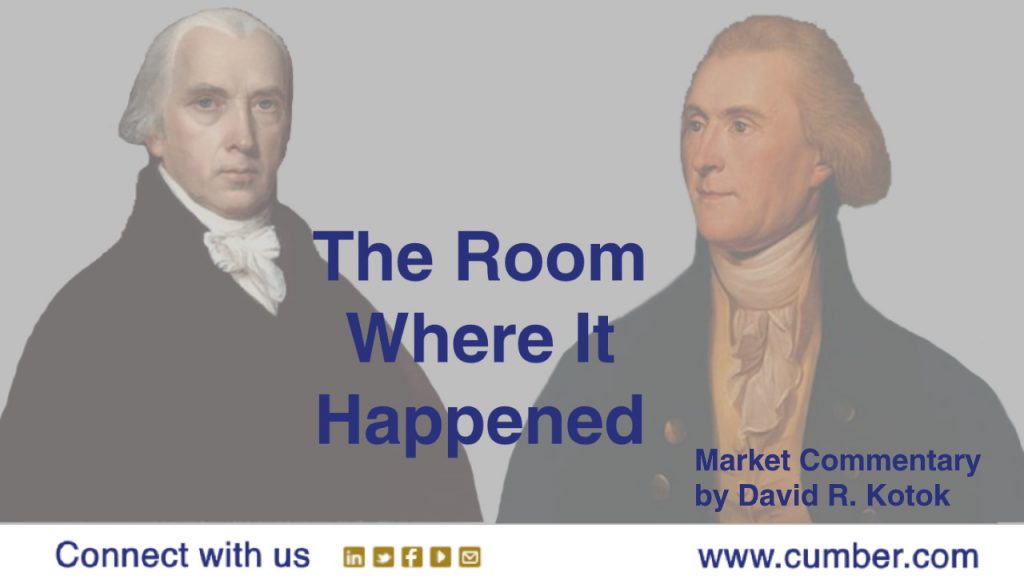Last Sunday morning we offered readers “The Room Where It Happened” (https://www.cumber.com/cumberland-advisors-market-commentary-the-room-where-it-happened/). We thank many readers for their kind replies. Here are just a few.
Harvey wrote: “All I can say is, patience is a virtue, along with not wanting to spend hundreds to see a play, no matter how well done, when we knew that Disney, or whoever, would allow us to see it for under ten bucks. We indeed live in very historic times.”
(Name protected) sent this: “On the promise to pay pensions. I'm retired, with CalPERS. We were paying into retirement for many years. It was super-funded. The city came back during a negotiation for wages and offered no pay raises, but they would pay all pension amounts. So at that point employees did not get a pay raise in the contract, and the city of Long Beach said it would pay the employees’ part. All was well. The city then said the fund was super-funded and stopped paying into the fund. When the 2000 financial problems came about, they ran to Sacramento and said, “We need to stretch out further payments into CalPERS.” They agreed, and management came back to LB in glee. When the next financial problem occurred, they did not start adding more into the fund. And yet the CalPERS long-term plan paid full amount by people in the plan doubled the required payments or accept less benefit if needed. Yet the city never started paying more into CalPERS, a different but similarly invested program. Now employees are paying a little back into CalPERS, but the city has not covered the shortfall. The pension was not promised but was part of our agreed pay. They are short because they have not been paying enough into the program for years. Hiring more employees, new programs but not covering employee pay (CalPERS retirement payments). So the pay was withheld, and fraud may be a better word than ‘promised pension.’ They need to sell assets and pay their bills.”
Dave J. sent this exquisite tutorial: Long-time reader, first-time replier. Thank you for analogizing our current environment with the context in the fledgling United States around the passage of the Assumption Act, when much of the population still remembered the Articles of Confederation and was leery of government by a national government. I wanted to correct you on one bit in your email: the Capital was actually in NYC at the time. The City of Brotherly love was chosen as temporary capital as part of the compromise with the Pennsylvania delegates. One additional piece of information to show just how thin margins are, the Assumption Act only passed both chambers of legislature by the narrowest margin not requiring the VP to vote.”
Kotok note: Dave is absolutely correct and we thank him for the “catch.” As hard as we all try, five of us missed this in the editing, proofing, and final preparation of the piece.
I have saved Fred’s comments for the end:
“Two added points to contemplate:
1. ‘The other side’ of what Jefferson, Madison and Monroe achieved in that room was a government that would assure ‘the bargain’ that brought slave states into the revolutionary war – assurance that Lord Mansfield’s Court of King’s Bench decision of 1772 would not be applied in the new nation for at least 80 years (hence the ‘four-score’ in the Gettysburg address).”
Fred then extracted the following from Judge Mansfield’s opinion. Readers please recall that this was four years before the Declaration of Independence and was from the Lord Chief Justice of the English Court.
"The state of slavery is of such a nature, that it is incapable of being introduced on any reasons, moral or political; but only positive law, which preserves its force long after the reasons, occasion, and time itself from whence it was created, is erased from memory: it's so odious, that nothing can be suffered to support it, but positive law. Whatever inconveniences, therefore, may follow from a decision, I cannot say this case is allowed or approved by the law of England; and therefore the black must be discharged." - William Murray, 1st Earl of Mansfield
(Source: https://en.wikipedia.org/wiki/William_Murray,_1st_Earl_of_Mansfield)
Fred then made this point: “We keep forgetting Hamilton’s caveat that a public debt is an ‘asset,’ but only if it is well managed (so as to add value). It is on both counts that we seem constantly to ignore even the most thoroughly learned lessons of history."
Happy Sunday morning to all. Please be safe and careful.
PS: For those who would like to pause for a moment and read it, here is a link to President Abraham Lincoln’s eloquent Gettysburg Address: https://rmc.library.cornell.edu/gettysburg/good_cause/transcript.htm.
David R. Kotok
Chairman of the Board & Chief Investment Officer
Email | Bio
Links to other websites or electronic media controlled or offered by Third-Parties (non-affiliates of Cumberland Advisors) are provided only as a reference and courtesy to our users. Cumberland Advisors has no control over such websites, does not recommend or endorse any opinions, ideas, products, information, or content of such sites, and makes no warranties as to the accuracy, completeness, reliability or suitability of their content. Cumberland Advisors hereby disclaims liability for any information, materials, products or services posted or offered at any of the Third-Party websites. The Third-Party may have a privacy and/or security policy different from that of Cumberland Advisors. Therefore, please refer to the specific privacy and security policies of the Third-Party when accessing their websites.
Sign up for our FREE Cumberland Market Commentaries
Cumberland Advisors Market Commentaries offer insights and analysis on upcoming, important economic issues that potentially impact global financial markets. Our team shares their thinking on global economic developments, market news and other factors that often influence investment opportunities and strategies.


